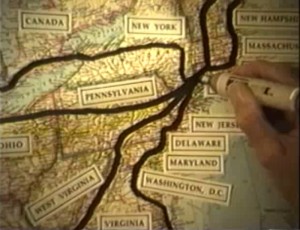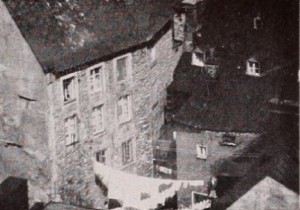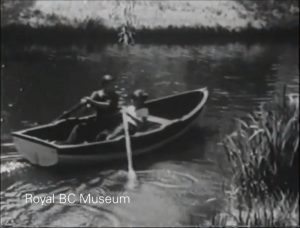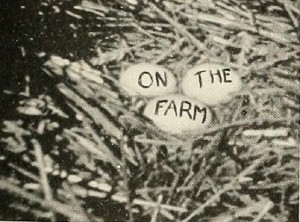
"During five summers from 1957 to 1961, the five-member Barstow family of Wethersfield, Connecticut, set out to visit all 48 of the then United States of America on a series of month-long camping trips. Part II showcases "America's Wonderlands" with 18 National Parks and other exciting attractions in the great Northwest and Southwest." Archive.org

"A schoolboy in need of material for a geography theme launches Five Days From Home, as Dad gets out the movie projector and shows Son the cine harvest of his summer holiday. Among the points covered in a whirlwind auto trip from New York to Canada are Quebec City, Montmorency Falls, a Canadian pulpwood mill and Ausable Chasm, in New York State. Mannie Lovitch's handling of these subjects is always competent, occasionally excellent. His inquiring camera found many scenes of quaint charm in the old St. Lawrence city, and his full scale visual treatment of the pulp mill is sustained in interest by a superb bit of scoring with modern music by Virgil Thompson. Of especial note is Mr. Lovitch's mobile cross-cutting of the three to four themes which make up his coverage of the usually difficult Ausable Chasm." Movie Makers, Dec. 1948, 493.
"A record of a summer trip with humorous twists." American Cinematographer, Feb. 1936, 73.
"If Summer Comes. "What does summer mean to you?" asks the narrator. It means different things to different people, but in this poetic film he describes what summer means to him – fishing, walking through the woods, filling his pockets with crabapples, searching for little animals by the stream, and so on. A nostalgic little study, smoothly carried out" PSA Journal, Sept. 1965, 50.

"An impressionistic portrait of city life during a day off in the summertime, with poetic narration set opposite some very observant and intimate views of Vancouver and its inhabitants. These include numerous street scenes; departure of the passenger ferry 'Hollyburn'; shots of and from Interurban railway and streetcars; sequences on Chinatown, Kitsilano Beach, Stanley Park, Victory Square, and the downtown waterfront; and a glimpse inside a typical beer parlour. The film received honourable mention in the amateur category at the 1950 Canadian Film Awards." (BC Archives)
Opening credit reads: "The Vancouver Branch of the National Film Society presents..."
Additional credits (on 1986 restored version): "Restored 1986 by Dennis J. Duffy for National Film Week '86 in co-operation with Canadian Filmmakers Distribution West and the Provincial Archives of British Columbia. Restoration funded by BC Heritage Trust."
"Nancy tells and shows in a series of five flashbacks what impressed 12 year old Nancy most during her summer vacation. Many a family vacation film ends with the unpacking of the car and bringing in the suitcases. That is where this little vacation film begins. As Nancy unpacks her bag she looks at the things she has brought home and they remind her of her summer's events–boating, woodgathering and the removal of a splinter from grandfather's hand, the milkweed plants and the monarch caterpillar, swimming, a picnic, feeding the birds, and playing with other girls her own age. This is decidedly different from the ordinary travel film, and much of its charm comes from the voice of a young Nancy as she narrates the film. It won the MPD Travel Film Award" PSA Journal, Sept. 1965, 50-51.
"Black and white film highlighting the summer activities of ‘Little Brother,’ his older brother, and other children." Church History Library.

"Sunlight and morning noises, the rich, sweet smell of clover, the hot grain fields at midday and windmills drawing water from the deep earth — these are part of the common life of an Ohio farm that two young girls, Marjean and Mary Elizabeth Headapohl, have put into their film, On the Farm. It is a record as American in feeling as Walderts Pond, even though unconsciously so. Innumerable closeups show the generousness of the earth in Ohio, whether in flowers around the house or in the grain and vegetables of the fields. Day after day, the imponderable clouds drift by. Peas are shelled for dinner; the cows are brought in from the pasture by the collie dog; the farm hands return to the barn after a day of harvesting wheat. There is little more shown, in substance, and presently the film ends. But it leaves one with a conviction that this simple way of life in America cannot easily be changed, and that, as long as people of good hearts make records such as this, we cannot wholly forget that the Republic was founded on the plough." Movie Maker, Dec. 1940, 603-604.
"Coastal people, places and scenery between Vancouver Island and the mainland. Includes footage of Indian villages, pictographs, birds and wildlife, logging operations, other vessels, etc." British Columbia Archives.
"Cruise on Toketie. Coastal people, places and scenery between Vancouver Island and the mainland. Includes footage of Indian villages, pictographs, birds and wildlife, logging, other vessels, etc. Notably, there are good shots of the abandoned villages of Gwayasdums, Karlukwees, and Mamalilaculla, as well as the burial ground on Klaoitsis Island" British Columbia Archives.
Total Pages: 3